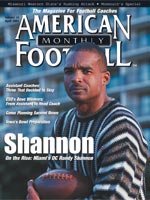AMERICAN FOOTBALL MONTHLY THE #1 RESOURCE FOR FOOTBALL COACHES
Article CategoriesAFM Magazine
|
The Long Red LineEducate, train and inspire the special forces so that each is a leader of character, commited to the values of duty, honor and discipline; a limetime of selfless service to the forces.Offensive Line Coach, Monmouth (IL) © More from this issue As football coaches, we have all heard the theory that the difference between winning and losing close games often comes down to special teams play. At Monmouth College, we believe sound execution, communication and efficiency in the kicking game are the cornerstones for success. Special teams demand a great deal of preparation, organization and attention to detail. Philosophy Our mission is to educate, train and inspire the Special Forces so that each is a leader of character committed to the values of duty, honor and discipline; a lifetime of selfless service to the forces. We believe we must use the best players available, utilize meeting and practice time effici....The full article can only be seen by subscribers. Subscribe today!
|
|
|||||||
| HOME |
MAGAZINE |
SUBSCRIBE | ONLINE COLUMNISTS | COACHING VIDEOS |
Copyright 2025, AmericanFootballMonthly.com
All Rights Reserved





